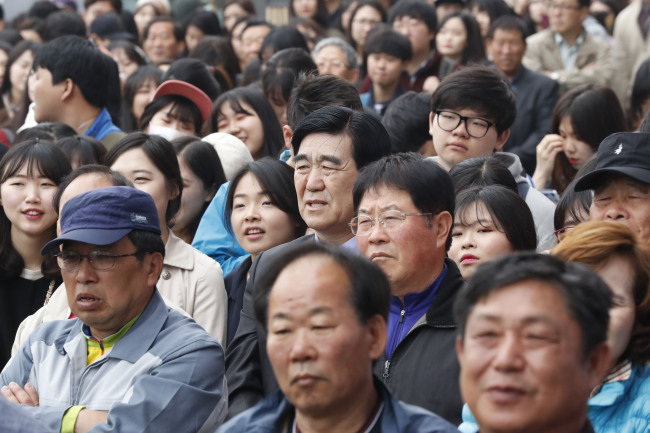Four years ago, when South Korea picked its new parliament as well as president, the political platforms were dominated by welfare policies as the mainstream parties scrambled to roll out pledges to eradicate inequality and social polarization.
But the mood on the campaign trail for the general election appeared to be different this time: The rival parties either scaled back the scope of their welfare pledges or glossed over how they would fund the initiatives. Many of the policies also resemble one another, making them less of a factor for voters in casting their support.
The ruling Saenuri Party, for one, pledges to take a “tailored” approach toward their welfare policies by offering targeted recipients with the required assistance. The conservative party had promised to adopt universal welfare policies during previous elections, such as free education and child care for all.
 |
| Citizens watch a general election campaign in Wonju, Gangwon Province. Yonhap |
“In order to maximize efficient use of limited resources, we need to shift from universal welfare programs toward tailored policies,” said Kang Bong-kyun who manages the Saenuri Party’s election campaign. “Based on the tailored approach, we have determined our election pledges,” he said.
Except for a commitment to “gradually” provide free education to all high school students, the Saenuri Party decided to remove universal welfare programs from their manifestos. Instead, they introduced programs targeting specific recipients.
Among them is the pledge to increase the senior citizen’s pension for the elderly “without measures to live their retirement.” The party said that it would determine who needs assistance the most and raise the pension to 400,000 won per month.
The main opposition Minjoo Party of Korea introduced a broader but similar approach toward senior citizens. The liberal party vowed to raise the basic pension for the elderly to 300,000 won for everyone outside the top 30 percent by income by 2018.
Even though both parties scaled back, they have still failed to come up with specific ways to fund these welfare programs. According to the parties’ manifestoes, the Saenuri Party’s initiative would cost about 56 trillion won and the Minjoo Party’s would cost some 148 trillion won.
The Saenuri Party seeks to collect more taxes by “revitalizing” the economy, while the Minjoo Party vows to increase corporate taxes and divert money from National Pension Fund to help fund the programs.
“It would cost more than 200 trillion won for the parties to implement those programs. But their plans do not sound like a viable plan to secure money,” said Lee Kwang-jae, the secretary-general of the Korea Manifesto Center, a civic group to monitor the parties’ election pledges.
Other aspects of the parties’ welfare promises, in the meantime, are almost identical, the observers noted, right down to how they are abstract without details.
All three parties — Saenuri, Minjoo and the People’s Party — vow to provide services to support women who have had their career suspended due to childbirth and childcare. The Gender Ministry already runs 136 such agencies nationwide.
Both the Saenuri Party and the Minjoo Party promise to improve the learning environment of “classrooms suffering from sweltering heat or freezing temperatures.”
All three parties pledge to build more infrastructure to help mobility of the disabled, without any details.
The two leading parties also touch on helping women and children victims of abuse, a topic of attention this year following several high-profile cases, also, without clear details.
For the elderly, the pledges continue to be “populist,” according to critics.
The Saenuri Party vows to create more than 500,000 jobs by creating a special economic zone for local companies returning home after operating overseas.
The Minjoo Party pledges to create more than 700,000 jobs for young people by expanding mandatory youth employment measures to not just state-run institutions but also private companies. The liberal party argues that the plan could create more than 250,000 jobs.
But critics have said that the Minjoo Party’s plan is a measure that could distort the labor market and accused the Saenuri Party’s program of duplicating former election pledges made during President Park Geun-hye’s presidential campaign.
“The parties’ pledges to create more jobs need to be thoroughly monitored and assessed,” said Baak Kyung-hoon, a vice president for the Youth Forum. “We should be worried about rosy promises with fancy numbers,” he said.
By Yeo Jun-suk(jasonyeo@heraldcorp.com)

